If you are a fan of science fiction roleplaying games, then you probably know of Marc Miller. Back in the late 1970s he designed Traveller, which is without doubt one of the most well-loved scifi games out there. Last year I got in touch with Mr. Miller and asked him if he was interested in answering a couple of questions for our readers and luckily he agreed.
I have done quite a few interviews with game designers in the past, but this time it was special. As some of you may know, Traveller was the first roleplaying game I bought, and even though I played it less often than I wished, it always had a special place in my heart.
Just recently I started to read up on the history of Traveller, its ups and downs, and I also started collecting Traveller material (in print and PDF). But I still didn’t know much about its creator, his ideas and his dreams for the future of the game. So when I had the chance to ask for an interview I immediately grasped the opportunity. But I digress. Without further ado, here are our questions and his answers:
Stargazer: Let’s start at the beginning. Could you please tell us about how you got into roleplaying games in general? What was the first game you played and what made you want to write your own?
 Marc Miller: When Dungeons & Dragons came out, I was a wargame designer. In a sense, the fantasy role-playing idea was new, but in another sense, it was a familiar concept. I had done political role-playing exercises in college: model UN and model Organization of American States, and some campaign simulations.
Marc Miller: When Dungeons & Dragons came out, I was a wargame designer. In a sense, the fantasy role-playing idea was new, but in another sense, it was a familiar concept. I had done political role-playing exercises in college: model UN and model Organization of American States, and some campaign simulations.
What struck me (and everyone else) about D&D was the application of numbers to the individual character and role. Gary Gygax’s conversion of role-playing from a touchy-feely analog system to an easy-to-use digital character system was brilliant, even if we couldn’t quite put it into words. D&D literally took over everyone at Game Designers’ Workshop, and after a couple of weeks, we (the designers and owners) had to make an important rule: no D&D during work hours. Nothing else was getting done.
So we played in the evenings. Based on our experiences, Frank Chadwick designed his Three Musketeers game En Garde! as he digested the idea of fantasy role-playing, and I started working on a science-fiction role-playing game concept that became Traveller.
Stargazer: What games and books were your main inspiration for Traveller? Is there something like Gary Gygax’ Appendix N for Traveller? What books would you recommend to people new to the science fiction and space opera genres?
Marc Miller: There have been some excellent analyses of the literary antecedents of Traveller, and they go into far more detail than I can provide here, but let me tell you just a few inspirations that I can recall off the top of my head. And I recommend, if you have not read these authors, to make a point of doing so: Larry Niven and his Known Space stories. Poul Anderson and his Flandry of Terra series. All of Isaac Asimov’s Foundation series. And the quintessential Traeveller: E. C. Tubb’s Dumarest of Terra.
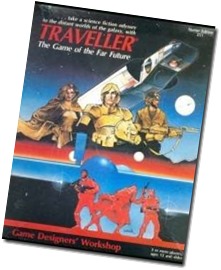 Stargazer: While rereading Classic Traveller recently I noticed that the encounter tables and other parts of the rules hint towards a certain play style. It seems as if the referee was supposed to basically use the random generated events as inspiration and improvise at the game table instead of meticulously planning adventures beforehand. Is this how you planned the game to work?
Stargazer: While rereading Classic Traveller recently I noticed that the encounter tables and other parts of the rules hint towards a certain play style. It seems as if the referee was supposed to basically use the random generated events as inspiration and improvise at the game table instead of meticulously planning adventures beforehand. Is this how you planned the game to work?
Marc Miller: I think that players can adopt any style of play they prefer. As the designer, it is my responsibility to make materials available that will support them in their choices. On the other hand, there are players (and referees) who come to the game without experience in other games, or without specific preferences in how they will player and what they will do. In my designs, I want to make available some guidance in what to do, and you see that, however imperfectly, in the texts and tables.
I recently refereed (we use referee instead of GM or DM) a two-hour session of Traveller at GaryCon. In that sort of situation, the focus is on having a good time rather than slavish adherence to rules that some players have not even read. I used random events to control the action. Specifically, I imposed a “force field” around their ship as an obstacle, and they had to overcome it. Frankly, I had no idea what the field die, except that it was big, and they couldn’t get through.
Everything after that was driven by random events and the players’ responses. Someone used his strength to push on the field, and it budged a little. Another used dexterity to try to wiggle a knife into the field, and he succeeded. I was as surprised as they were that something DID penetrate the force field. They tried many things that didn’t work, but ultimately, two of them forced their rifle barrels into the field, and then levered them to create a bigger opening. They succeeded, and made a space big enough to crawl through.
What I liked was this particular scenario took a winding path to a destination even I had not thought of. On the other hand, imagine the smartest of the characters pushing against the field and saying, “I’m testing to see if this field is impenetrable.” He would have checked Intelligence, probably succeeded, and the logical answer would have been: “Yes, it is.”
Stargazer: Classic Traveller is (in)famous for the fact that your character can die during character creation. I have always wondered why you put this into the game. Could you please explain elaborate?
Marc Miller: The answer is actually reasonably complex. Traveller is a levelless system: characters may get better, but they don’t level up; they improve in skills, but at a cost in age. They also don’t all start as young adults: the character pre-generation lets everyone build an experienced character. They question how experienced can they get.
When we first started playing (and testing), many players were creating experienced retirees with loads of skills and loads of money. I had an intuitive understanding that there had to be some risk they faced in this pre-generation system, and I added the chance that they could die.
People still argue about whether that’s right.
Stargazer: Especially when reading Classic Traveller I get the impression that it is meant as a game which allows me to use any setting. Creating new subsectors, sectors, planets, space ships etc. is a huge part of the game. On the other hand there’s the very detailed Third Imperium setting beloved by many fans. Was the Third imperium always part of your vision for Traveller or is it something which evolved over time after Traveller was available to the public?
Marc Miller: You have read it exactly right. My vision for Traveller was more GURPS-ish: a universal science-fiction role-playing system that anyone could play against any existing SF texts. It could be Asimov’s Foundation, or Anderson’s Terra.
I soon found two issues I had to deal with.
First, not everyone had read all these great classics: they knew Star Trek and Star Wars, and maybe a few others, but they didn’t know the vast range of details in the various SF universes. They wanted me to supply details.
Second, every time I supplied a detail, it needed a background. How did the star drive work? Its speed had consequences on the economics of the universe. What was the local money? If it was credits (and it was), who issued them, and could they be counterfeited. The questions went on and on; the answers became the Third Imperium.
But I’ll make another comment: I tried to make this future society understandable and relatable. I avoided a universe where interstellar navigation was a monopoly for drug-assisted mutants, or where interstellar governments were ruled by crazed religious zealots. I wanted the players to feel comfortable in the environment, making decisions that mattered to them rather than always fighting against strangeness that was never explained.
Stargazer: The personal combat system in Megatraveller seems way more complex and detailed than the one in the original Traveller. For me this seems almost like a change of focus of the entire game. Can you tell us a bit about what led to these changes?
Marc Miller: The focus of many role-playing games is combat, and that has been true from the very beginning. I think that it is natural to try to create an accurate (and even in-depth) system.
But your question also brings up an interesting part of role-playing games. You may recall that the very first role-playing game (and by that, I mean Dungeons & Dragons) had rules for Combat but not for just Discussing or Persuading or Convincing. I think that set the tone: rules for fighting, but just turn ordinary conversation over to the players and their characters for role-playing.
Now, I think there is a place for, and a need for, good rules for non-violent interaction. I think players should be able to use their character’s abilities in non-violent ways and have the outcome be based on those abilities rather than the player’s ability to articulate what he or she wants to do.
But, the MegaTraveller combat rules reflect what was both popular and important when that particular edition came out.
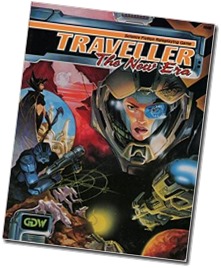 Stargazer: Traveller: The New Era uses a rules system which doesn’t have much in common with the other editions of Traveller. I also noticed that the game’s design was by Frank Chadwick and Dave Nilsen, you are only credited as the original creator of Traveller. And again there seems to be change of focus of the game. Can you tell us about the development of the game and your involvement? What are your thoughts on TNE in general today?
Stargazer: Traveller: The New Era uses a rules system which doesn’t have much in common with the other editions of Traveller. I also noticed that the game’s design was by Frank Chadwick and Dave Nilsen, you are only credited as the original creator of Traveller. And again there seems to be change of focus of the game. Can you tell us about the development of the game and your involvement? What are your thoughts on TNE in general today?
Marc Miller: The New Era was an attempt to being the Traveller rules under the overall umbrella of the GDW House Rules system (that is to say, the Twilight: 2000 rules set). There were both marketing reasons (easier for players in one system to transition to the other setting) and design reasons (easier for the designers to adapt inspirations they had in one setting to the other) for the change. But the real reason for The New Era was to try to introduce chaos into the system.
Players thrive on chaos: they find enemies to fight and fortunes to be won if the overall universe is chaotic, and the plan was to make that happen.
I will confess that the implementation was less than successful, and I will give two reasons.
First, GDW designers like order rather than chaos, and even when they try to introduce chaos, they are also writing stories that work at reducing chaos. There is always a striving for order and peace rather than increasing disorder. In retrospect, the system could have concentrated on hunting and killing the Vampire Fleets with lots of space combat and an unending supply of enemy ships. Instead, it concentrated on rebuilding safe worlds and societies, and I think that was less than successful.
Second, we were all daunted by a problem imagining very high technology. I know that I had trouble imagining Tech Levels above 15 in Classic Traveller, and even Mega and TNE failed in showing what truly unimaginable technology could be.
Did I answer your question about where I was in that design sequence? In that period, after some 15 years of designing games, I was in a burn-out period, and I took a break. I tried other things: a job in the real world selling insurance. I learned a lot, including some skills in the business worlds, and although I came back to game design, I think I was the better for it.
Stargazer: The latest edition of Traveller 5 consists of an impressive tome of over 650 pages. Personally I haven’t read it yet, but from what I gather there was quite some controversy over the game among fans. Can you tell us a bit about what your design goals for T5 were? Do you see T5 as the perfect game for any Traveller referee or was it meant for a certain subset of gamers?
Marc Miller: You need to read it. At least open it up and see what’s in here.
Seriously, the first Traveller—Classic Traveller, the Little Black Books—was published on the installment plan, much like Charles Dickens novels. We published the first three LBBs in 1977, and then six more rules Books, thirteen Supplements, thirteen Adventures, six Double Adventures, six Alien Modules, several Board Games, an Atlas, a set of Miniatures rules, and a couple other books. The initial publication was 144 pages, or about 60,000 words. The rest of Classic Traveller was (and I ball park estimate here) about 2600 pages or slightly over a million words. It took about ten years. And by the way, it cost about $350 for the set. But over the course of ten years, it was also money well spent.
I started working on Traveller5 when Traveller4 closed down, and I had a vision: I wanted to cover everything I possibly could in one master volume. I wanted not only to repeat the things that we had covered already: characters, combat, starships, worlds, animals, and adventure. I wanted to cover things I had dreamed of. A comprehensive easy-to-use process for creating weapons and equipment. A full range of aliens, including a way to create them randomly, plus the special science-fiction aliens: clones, artificial people, robots, even artificial intelligences. More details for worlds and their environments. A process for creating terrain, from large continents to small localities. An integrated combat system seamlessly covering the spectrum from personal encounters, to vehicles, to starships. A non-combat system that resolved disputes between characters and non-player characters. There’s more. I wanted to have it all there in one book.
For the most part, it is.
It isn’t perfect, but it is the best we could do; I accept that nothing will ever be truly perfect. We can only try.
But this comprehensive volume is not for everyone. The more casual players need something more adapted to their subset of needs: a Players’ Manual. We’re working on that. There are other more specific subsets we’re working on: an exciting starship miniatures game; several adventures, and certainly more. Plus the novels. Oh, we’ll talk about those in a bit.
Stargazer: What is the future of Traveller? Are there plans for further updates to T5 or are there even plans for T6?
Marc Miller: After TNE came Traveller4. That was an ambitious project trying to mainstream Traveller to a wider audience. Alas, it failed. But on the foundations of that project I started the two-decades long effort to revise it into Traveller5.
It was an ambitious project, and I wanted to incorporate all of the lessons I had learned over the years about role-playing and Traveller and game design. I wanted to include non-violent conflict resolution rules, and ideas on very high technology that players could encounter and use. I wanted to have rules for aliens, and alien creation and design. I wanted rules on how to design weapons, and vehicles. I wanted the system to be complete in one book.
That central Core Rules Book is the result. There are some tweaks being done, but it basically achieved what I wanted.
There is, of course, more than that. With the Core Rules complete, I can distill them into simpler rules for a Players Manual of just the basics, or into specialized titles that deal with specific things like space battles of world exploration. And we’re working on all that.
As to T6, I don’t think were are going to do anything like that for a long, long time. But I do have an idea for what I call T8- Traveller for Eight Year Olds: a way to play Traveller with our children or grandchildren. I’m working on that.
Stargazer: For a lot of people I know the first introduction to Traveller was quite recently through the books produced by Mongoose Publishing. From what I understand T5 and Mongoose’s version of Traveller are not compatible. If I am happy with the Mongoose rules, why should I get a copy of T5 as well? Or let me put this differently, how can a referee make use of T5 even if they are running an older edition of the rules?
Marc Miller: During the T5 design process, Mongoose came to me and wanted to do their own Traveller edition. Their concept was simpler than mine, and we agreed that the goal was a widely available Mongoose Traveller and my own focused Traveller5. Sort of the Traveller and Advanced Traveller concept. There would be cross-fertilization of the concepts in each, and a joint development of the Traveller universe.
Which edition to choose? I think someone who likes Mongoose Traveller should be perfectly happy playing in that rules system and universe. And I appreciate their support.
But role-playing referees are constantly looking for material that will enhance or support their own particular campaign.
Stargazer: With all the editions of Traveller still readily available it becomes pretty hard for new players to choose the right edition for them. What edition of Traveller would you recommend to new players and why?
Marc Miller: So this question is an extension of the last. Each edition of Traveller appeals to its own particular type of player. The older editions continue to be available for the players who played them once upon a time and have fond memories of that material. I am talking about more than just the GDW editions: some players prefer HERO, or GURPS, or D20, and there are editions for them.
But for someone new to Traveller, there are (in my mind) two choices: Traveller5 or Mongoose. I think either one will ultimately bring that player to the other, and the confluence of the two will add to their enjoyment.
And I will; comment, that we are working on the T5 Players Manual, which is (or will be) perfect for the casual Traveller player.
Stargazer: Last but not least I would love to talk about your novel “Agent of the Imperium”. What can you tell us about the story? Is the target audience mainly Traveller fans or is it suited for all fans of the genre?
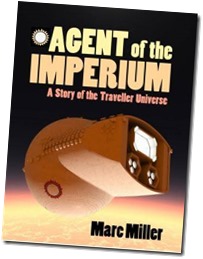 Marc Miller: Thanks for asking about Agent. When I finished the Traveller5 rules, they were fresh in my mind, and I had been thinking about stories to tell in the Traveller universe. I wrote this story over the course of some six months and really enjoyed the process. Fiction let me show different aspects of the Traveller universe: not just show them, it let me puzzle out how they worked. I was able to take so much of the material and bring it to life in ways that I had not thought of before.
Marc Miller: Thanks for asking about Agent. When I finished the Traveller5 rules, they were fresh in my mind, and I had been thinking about stories to tell in the Traveller universe. I wrote this story over the course of some six months and really enjoyed the process. Fiction let me show different aspects of the Traveller universe: not just show them, it let me puzzle out how they worked. I was able to take so much of the material and bring it to life in ways that I had not thought of before.
If you like SF or space opera, then its readable for you, whether you know Traveller or not. But for Traveller people, it has its own special appeal.
Stargazer: Thanks again for answering these questions for us. The team of Stargazer’s World wishes you all the best in your current and future endeavors!
This concludes our interview with the man who created Traveller! If you are looking for older editions of Traveller or the new 5th edition, check out the official Far Future Enterprises website.

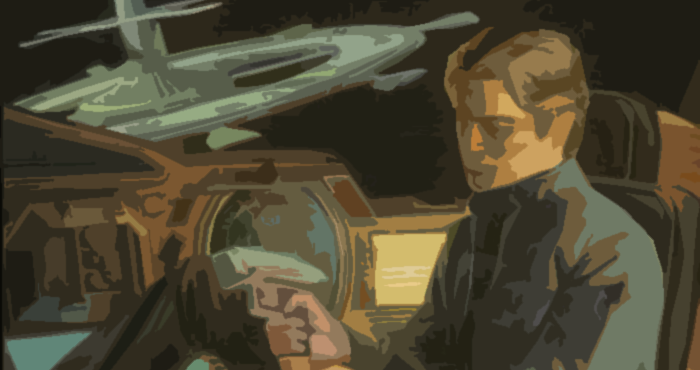
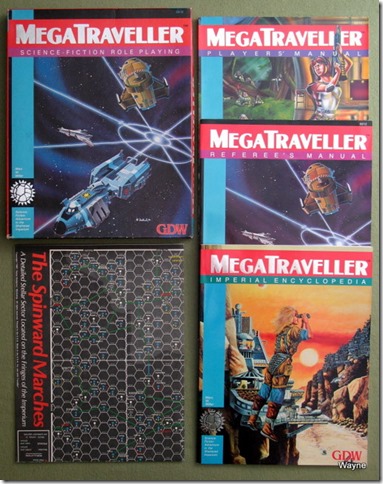
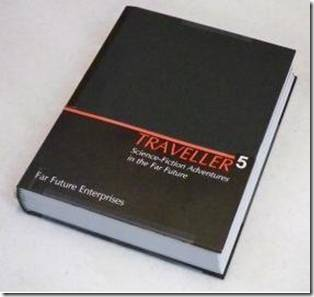
Thanks for the interview!
Not a Fan of Dune, is he?
What makes you think that?
Yea, I read it that he maybe was a fan of Dune, but didn’t think that was what he wanted to encode into an RPG.
Seems like T5 is very hard to find in print.
Yeah. It’s even out of stock on the official FFE site.
Miller ‘borrowed’ everything from Tubbs. Not very original.
Everything? I don’t think so.